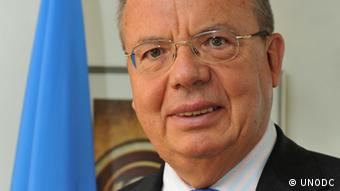Unprecedented Increase in World Opium Production
Interview with Yuri Fedotov
Yuri Fedotov, the head of the United Nations Office on Drugs and Crime, tells DW that Afghanistan is now producing record amounts of opium poppy which is destined to become heroin in “new markets.”
DW: There is concern in the United States and Europe of a flood of heroin on to their markets – where is that heroin coming from?
Yuri Fedotov: There are different sources of heroin and basically if we take Europe it comes mostly from Afghanistan – which produces almost 80 percent of all opium and heroin in the world – and unfortunately the latest reports of the UNDCP show there is an unprecedented increase both in cultivation and production of opium – especially in cultivation. There is a record figure that has reached 200,000 hectares.
They never had such an area of opium poppy cultivation even in the peak of production in 2007 and 2008. So it means that producers and drug dealers, they are guided by the well-known principles of a market economy, and they would never increase production if they were not sure there will be new markets. Destination is mostly Europe but also Africa. Our recent report on Africa indicated there are more and more seizures of heroin in West Africa in addition to cocaine which goes through the trans-Atlantic route from South America to Europe through west Africa. Some of this heroin may reach the United States as well but we estimate that this is not the major route supplying heroin to the United States.
80 percent is the figure given for the increase in use of heroin in the US in recent years – given all the effort that is put into drug control, doesn’t it suggest that the policies are failing?
It depends on how you appreciate that. Indeed in the United States there has been a tremendous, a quite noticeable decline in consumption of cocaine in recent decades, almost four-fold, which indicates there are some results but the recent trend of course, the greater use of heroin but also prescription opioids, is a new quite worrisome trend. It means that more efforts have to be done to understand this phenomena and to take appropriate steps.
You’ve mentioned opioids and drug enforcement officials are also talking about a link between prescription pain killers and heroin abuse. Is it the case that heroin users are moving from those drugs to heroin because of restrictions on the prescription drugs?
I don’t see there are major problems in the US of getting prescription drugs. Of course it’s more complicated – you need to see a doctor – but there’ve been no reports of major problems in getting these drugs if they are prescribed by doctors. The point is, prescription drugs produce a less effective high – the state of euphoria is lower than when you are using heroin. Of course when they are already addicted they want to get more and they switch to heroin. Also another explanation is that they can get heroin, not pure heroin but up to 30 to 40 percent purity, so it means it’s less expensive than some of the prescription drugs with a more powerful result.
Copyright Deutsche Welle 2014
Yuri Fedotov is the Executive Director of the United Nations Office on Drugs and Crime. He is a former Deputy Foreign Minister of the Russian Federation and a former Russian ambassador to the United Kingdom.



